牛津创新手册(PPT 30张)
牛津7B Unit5 Amazing things Integrated skills课件(37张PPT)

with the other _a_t___ _th_e___ s_a_m__e_ t_i_m_e__.
Peter
I learnt about _a_n___ __a_rt_i_s_t _. He can draw _3_-_D___ pictures with _c_h_a_lk__.
6.8 metres.
Amazing things about people
The shortest man in the world was 51cm tall.
somethin g amazing
He can write with one hand and draw with the other at the same time.
People call them the ship of the
desert (沙漠).
camel
What can you see?
an ant ants
hard-working They can carry the things several
times heavier than themselves.
amazing things about animals
Is it surprising?
It was surprising Ithwaats surprised to know that the monkey can read a newspaper.
amazing things about animals I know that a tiger can sing songs.
2012届高三英语大一轮复习课件(牛津版创新设计):第一部分高频语法 第三章 状语从
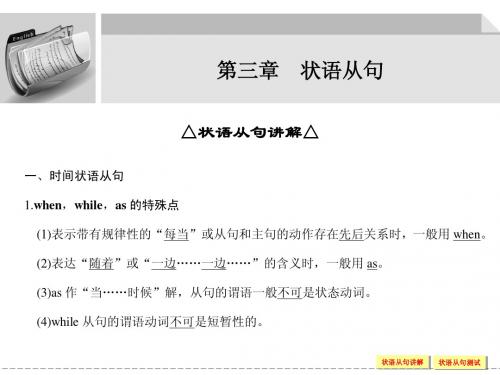
状语从句讲解
状语从句测试
5.until/till 引导时间状语从句的用法 (1)用于肯定句中,主句的谓语动词是延续性的,表示相应动作结束的时间。如:He worked until five o’clock.他一直工作到五点钟。 (2)用于否定句中,主句的谓语动词一般是短暂性的,表示相应动作开始的时间,意为 “直到……才”如: didn’t begin to work until five o’clock.直到五点钟他才开始工 He 作。 【例 11】A good storyteller must be able to hold his listeners’ curiosity ________ he reaches the end of the story. A.until B.unless C.when 答案:A 注:not...until 可用于强调句或倒装句中。 如:I didn’t know it until he came back.→ ①It was not until he came back that I knew it.[强调句] ②Not until he came back did I know it.[倒装句]
状语从句讲解
状语从句测试
4.since 引导时间状语从句的用法 (1)主句常用现在完成时,从句常用一般过去时。 (2)若从句谓语动词是延续性的,表示动作的终止;若从句谓语动词是短暂性的,则 表示动作的开始。 (3)固定句型:It is+段时间+since+一般过去时。 【例 8】 —Have you known Dr.Jackson for a long time? — Yes,since she ________ the Chinese Society. A.has joined 答案:D B.joins C.had joined D.joined
牛津深圳版(广州沈阳通用)八年级上册 Inventions课件(共16张PPT)

Do you know LászlóBíró? To raise reading interest. Maybe you do not, but you probably use his invention every day, and you may even have it in your hand right now!
you may even have it in your hand right now!
Bíró(1899-1985) was the 2. _i_n_v_e_n__to__r__(invent) of the ballpoint pen. He was born in Budapest, Hungary. In the 1930s, when he 3. _w__o_r_k_e__d___(work) as a newspaper editor, he used a fountain pen almost every day. However, he had to 4. __r_e_f_il_l___ (fill) it all the time. The ink also did not dry 5.___e_a_s_i_ly___(easy), and it sometimes made 6. __a___ mess on the paper. Bírówanted a 7._b__e_t_te_r____(good) pen. His brother, George, helped him 8._d__e_v_e_lo__p_
2. How did Bíró’s brother help him invent the ballpoint pen?
3. How does the ballpoint pen work?
牛津版 模块五 Unit1 Word power(共30张PPT)
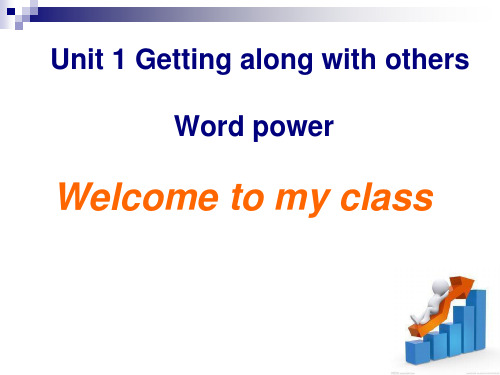
I have also made friends with my classmate Li Xiang, whose family is in Nanjing, just like ours. When we first met, I thought Li Xiang was quite (shy/outgoing) because he didn’t say much. But now I know that he is a very (friendly/unfriendly) and (dishonest/honest) person. We often study together and he helps me with Maths. I am happy to have such a (lazy/hardworking) classmate.
personality. (品格)
Oral practice
Look at the following pictures, choose one of the pictures and describe the character’s personality.
Snow white
and
Seven
Discussion
What kind of people would you like to make friends with?
What personality would you not like a friend to have?
Summary Good qualities in a friend
bad qualities
unreliable
badtempered
selfish mean
牛津译林m7u2Projectlanguagepoints.PPT

I have reached a point in my life_B__ I am
supposed to make decisions of my own. A. which B. where C. how D. why
.
10
1. severe(a) 严重的/严厉的 13. relation:关系
17.______把...介绍/引进给...
7. _____ sb to do 建议某人干 18. _____ (n).介绍/引进
8. ___ sb from doing :阻止某事发生
9. ______(n) 信号
19._____+_____+主语引导表
10 _____(n)迹象/符号/手势 后者情况和前者(___)一样
so/ as+助/系/情+主语引导表后者情况和前者(肯定)一样
•.
•6
I don't have to stay at home because of the virus, neither do you/they. I don't have to stay at home because of the virus, neither does he/she. We haven't studied on the internet for 10 days, neither has my son. My son hasn't studied on the internet for 10 days, neither have we. You can't do it, neither can I. He didn't finished homework, neither did I. He isn't good at sicence, neither am I. neither/nor+助/系/情+主语引导表后者情况和前者(否定)一样
英语必修Ⅱ牛津译林版Unit2名师创新课件1(共38张)

④high表示空间高度;highly表示程度,相当于much。 The plane was flying high. 这架飞机飞得很高。 I think highly of your opinde表示空间宽度;widely意思是“广泛地”,“在许 多地方”。 He opened the door wide. 他把门开得大大的。 English is widely used in the world. 英语在世界范围内广泛使用。
3/4/2020
2.地点副词:常见的有here, there, up, down, away, nearby, home, ahead, abroad, indoors, overseas, upstairs, downstairs等。 3.方式副词:表示行为方式的副词大多以ly结尾, 常见的有quietly, heavily, warmly, carefully, happily, politely, angrily等。 4.频度副词:常见的有always, usually, often, frequently, constantly, occasionally, sometimes, seldom, hardly, rarely, never等。
3/4/2020
20. A is+数词+times+形容词比较级+than B/A is+数 词+times as+形容词原级 as B/ A is+数词 times the + n.+of B A(在……方面)是B的多少倍 21. A is the+形容词比较级+of the two A是两者中 较……的一个 22. A is (the)+形容词最高级+in/of… A是……中 最…… 23. A is+形容词比较级+than any other n.(sing.) A比 任何一个别的……要……
英语必修牛Ⅱ津译林版Unit1创新课件1(共49张)

3/21/2020
句型探究 1. On average 2. take charge of 3. step up 4. due to 5. made up
3/21/2020
汉译英
1. The student didn’t show up until the second class.
2. The villagers did make up some stories of sightings.
3/21/2020
5、 possibility n.可能性
possibility of (sb. doing) sth.(某人做)某事的可能性 possibility that………的可能性
◆The possibility of food poisoning has been excluded. 食物中毒的可能性已被排除。
3/21/2020
7、 evidence n. [U] 证据,根据; 证词;迹象 vt. 使明显,证明
◆There is evidence that somebody has been living here. 有迹象表明有人一直住在这里。
◆He was punished for giving false evidence. 他因作伪证而受到惩罚。
3/21/2020
be in evidence 显眼;引人注目 evident adj. 明显的,明白的 It is evident that………是显而易见的
牛津创新手册第四章创新过程
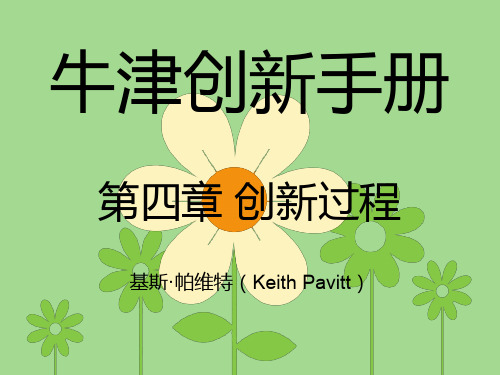
品设计与大学科研之间的反馈重要得多,制药企业则可能恰恰相反。 又如,对于提供生产资料的小型创新企业而言,用户可能是其重要的
创新源泉,而对于将产品卖给大规模市场的大企业来说,用户在创新中 的作用可能小得多,因为这些用户都缺乏较强的技术能力。
可循,但创新战略、创新管理在企业生产率、市场份额或盈利能力方面 仍能创造差异化。
第四节 知识向用品的转化
管理者将知识转化为产品、系统和服务,需要了解四个方面的趋势: 技术发展的轨迹和科学理论 相关的政府R&D项目 系统整合 管理不确定性的技术和方法
第四节 知识向用品的转化
一、保持技术实践(不要太)先于科学理论 1、科学理论对技术实践的指导作用仍然不够。 部分原因:实物制品和支撑其的知识基础的复杂性在上升 2、连续性创新:技术通过科学家和工程师的反复实践得到有力验证
第二节 企业创新过程
一、企业层面创新理论的现状 1、创新的学科交叉性
——企业层面的创新尚未存在能从认知上、组织上和经济上整合创新过程 方方面面的理论
经济学家:创新的经济动机和经济结果,一般忽略动机和结果之间的过程 组织学家:创新行为和创新过程在组织结构上和程序上的相互关联 社会学家:创新的社会决定因素和结果 管理学家:最可能导致竞争成功的创新实践 心理学家:创造力现象是人们的愿景受一组或另一组机会所限制的方式 …… 丰富的报告和数据资源
三种模式共同形成异质化和路径依赖的技术变迁模式,要求企业的过 程协调能力,包括企业内部协调和与外部其他企业之间的协调。
第三节 科学和技术知识的生产
二、功能的专业化和整合:工业R&D实验室 1、功能的专业化
(1)R&D实验室20世纪的主要创新源泉之一 (2)R&D实验室首先出现在德国的化学工业和美国的电气工业
牛津版Module8_ Unit1 Word power精品课件(共38张PPT)

He is the most famous playwright in the world, using about 21,000 different words in his plays.
He also wrote a lot of poems.
W. William Shakespeare (1564~1616)
journalist
biography
a book that tells what has happened in someone's life, written by someone else
biographer
autobiography
a book in which someone writes about their own life
What kind of literary work would you like to read? Why?
Some books are to be tasted, others to be swallowed, and some few to be chewed and digested.
writing 6. to plan roughly on paper 7. to change writing until it is suitable for
its purpose
B compile compose correct draft edit rewrite write
Discussion
• focus on feelings
1.Great Expectations 2. poetry
3. short story
4. short story writer 5. Romeo& Juliet 6. playwright
英语必修Ⅱ牛津译林版Unit2创新课件2(共66张)__幻灯片
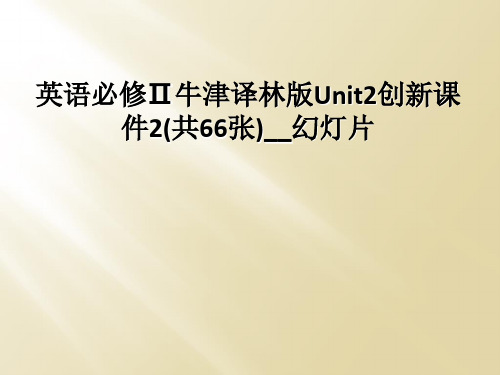
研读材料,完成下列内容:
Ⅰ.熟记重点单词
1.
n.便条,短信
2.
note
v.采访,访问
3.
n.日出;朝霞
4. interview n.装备,设备
5.
adj.总的,全体的
6. sunrise n.沉默
7.
n.背包
8. equipmentn.相机
课前自主导学
考点难点易混 点
语法考点导航
【用法归纳】 be scheduled for...定于……(时间) be scheduled to do sth 定于……(时间)做某事 on schedule 按照预定时间 ahead of schedule 比预定(时间)提前 behind schedule 比预定(时间)落后 a train schedule 列车时刻表
课前自主导学
考点难点易混 点
语法考点导航
【用法归纳】
suggest sth建议/提议某事
suggest(sb/sb's)doing sth建议(某人)做某事
...suggest that...shoulddo sth.
It is suggested that...shoulddo
sth建议……(应该)做某事
课前自主导学
考点难点易混 点
语法考点导航
误区警示 suggest作“建议”和“表明”“暗示”讲时,其后的宾语从句的语气有所不同:作“建议” 讲时,宾语从句用虚拟语气;作“表明”“暗示”讲时,宾语从句用陈述语气。 接宾语从句时,从句用(should+)do(虚拟语气)形式的动词有: 一 坚持 (insist); 二命 令 (order, command);三 建议 (suggest, propose, advise); 四 要求 (demand, require,request,desire)。
U4 Inventions-More practice 深圳牛津八上(共11张PPT)

A Read the script of a speech by a head teacher and answer the questions below.
Tomorrow we’ll have some experts here to talk to the students about the bad effects of playing computer games. They’ll also give some advice on how to use computers for studying.
If you don’t follow the advice, you will be the next one…
THANKS!
When I was young like you, I (8)___u_s_e_d____ to go outside more (9)___o_f_t_e_n___ and enjoy nature. However, you spend your time (10)_i_n__f_r_o_n_t_o_f___ computers instead. That’ll be harmful to your (11)__h_e__a_lt_h___. Tomorrow some (12)__e_x_p_e__r_ts__ will visit your school and tell you the bad (13)__e_f_f_e_c_t_s__ of playing computer games. You should listen carefully. Also, please find out how you can use the computer for (14)_s_t_u_d_y_i_n_g__ . I will help you and you should try to stop yourself from (15)_s_p_e_n_d__in_g__ so much time on computer games. Trust me and trust yourself. Love Mum
初二牛津课本课件(第7单元)(5)

初二牛津课本课件(第7单元)(5)Teaching plan of Chapter fiveSuccess storiesChapter topic overview:The main topic of this chapter is success stories. The main passage is a story about a famous pianist. The Listening section has a note-taking task in which students have to note down information from the telephone message. The Language section deals with the past continuous tense. The main task in the Speaking section is a survey activity about whether students help their parents with housework. The Writing section requires students to write a similar account of a fictional character. Finally, the using English section focuses on how to make pie charts..Period OneTeaching target1.To know some new words about thereading passage.2. To have a warm-up to know about some historical stories.Cartoon talk1Give students some time to look at the cartoon on SB B, page 57. Tell them to read the sentences carefully.2. Meaning of the cartoon:This cartoon focuses on two possible aspects of success: being rich and being famous. It is funny because Hi wants both things, not just one.Teaching courses:a. Pre-chapter activitiesLook at the pictures and answer some questions.●Who is she ?●Is she very famous?●How do you like her ?b. What do you know about…?You are going to read a success story. The people in the pictures below all have been successful. Match the names with their titles.●William (Bill) H. Gates : the co-founder of Microsoft , a leader in the computer and Internet industry.Gates discovered his interest in computers when he was just 13 years old. He studies at HarvardUniversity in the USA. In his junior year, he left Harvard to concentrate on Microsoft. He started thecompany in 1975 with one of his childhood friends. Paul Allen.●Fu Mingxia: a remarkable Chinese diver who has achieved a lot of success in her field. She was bornin Wuhan in Hubei Province, in 1978.She won her first world champion title in 1991,at the age of 12. At the Barcelona Olympic Games in 1992, at the age of 13, shebecame the youngest champion to win a goldmedal.●Jacky Chen : an international actor famous for his action films.c. Pre-reading---Part B Look and thinkAsk the students to listen to the tape about the reading passage. Then answer the following questions.1. Who is the piano prodigy?2. In what way do you think he is successful?3. When we say a person is successful, what do we mean?d. Vocabulary Box.prodigy: talentstunning (adj.): extremely impressiveat a price: involving sth. unpleasantstrict: demanding that rules must beobeyedwhile: during the time that sth. ishappeningquit: leave one?s job, school, etc.academy: a school or college for specialchance: a time when it is possible to dosth.fall ill: become sickin place of: instead offorever : in a situation or state that willalways exist.performance: the act of performing aplay, concert, etc.support: help or encourage someone orsomethinge. Practice----D Find the meaningsD1. Read the sentence belowand replace the words in italics with the words in the box.D2. Find the words in the box from thestory, try to work out their meaningsand then use them to complete thedialogues below.1. A What do you do you think of ______art?B It?s quite different from Chinese art, but itis also very interesting.2. A Is Nancy a member of the school?s violinclub?B Yes. Her ________ last night was great.3. A Hi, Jane. Would you like to go to thecinema with me this evening? I have got two tickets.B I?d really love to, but I h ave to do myhomework. My parents are very _____about it4. A My brother love basketball and henever misses a ________ to playbasketball with his friends.B It is my favorite sport too. Maybe your brother and I can play basketball together someday. D3 Choose the best meanings for theseexpressions from the story.1. He is stunning means that he ______.a has great talentb looks great2. His success came at a price means that hebecame successful_____.a easyb after much hard work3. A pianist suddenly fell ill means he or shesuddenly ______.a got sickb fell down and hurt4. Lang Lang was chosen to play in place ofthat pianist means that he played _____that pianist.a together withb instead off. Conclusionf. Assignments.a. Recite the new words and expressions.(from actor to orchestra)b. Listen to the tape about the reading passage three times.Period TwoTeaching target1. Revision2. While-reading.a. Listen to the pa ssage carefully and say “T” or “F” to each statement?b. Look through the text and fill in the form.3. To read it further and have a competition between boys and girls. Teaching courses:a. Review the new words and expressions.Fill in the blanks with the correct words.1.She felt honored to be accepted by theRoyal __________of Music.2.Her nice figure came___________.3.It is a ______she has long been waiting for./doc/c9551c4a2e3f5727a5e9626c.html ne ______after she got caught in the rain.5.He kept telling himself that it would notlast_____.6. You can use chicken_____ pork in this dish.7. The ___________started at 7 p.m.8. He is regarded as a tennis _______becausehe won ten tennis championships by age 18.9. I have decided to ______my job unless I getpromoted.10. My parents are always _______with me.11. The sunset looked absolutely__________.12. Most people at the meeting __________theproposal.13. Jim is reading _______his sister wasdoing her homework.b. Readinga). Listen to the passage carefully and say“T” or “F” t o each statement.1. The New York Times described Lang Lang with a short sentence because he was not worth mentioning. F2. Lang Lang?s parents started training him to be a pianist when he was very young. T3. Lang Lang won all his prizes without an effort. F4. Lang Lang?s father took him to Beijing because his job required him to. F5. Lang Lang?s life changed after a successful performance in 1999. T6. Lang lang is complaining about his parents, because they are too strict to him. F b).Look through the text and fill in the form. c). To read the passage further and have a competition between boys and girls. 1. When and where was Lang Lang born?2. What did The New York Times say about Lang Lang?3. What was he doing when he first heard western classical music?4. When did Lang Lang began taking piano lesson?5. When did he win first prize?6. His father was very gentle and patient to him, wasn ?t he?7.What was Lang Lang doing while other children were sleeping in parents arms 8. Why did his father quit the job? 9. When did get his big chance? Did he grasp the chance?10. How many performances does Lang Lang give every years? 11. What does he express to his parents?12. What qualities lead Lang Lang to be a piano prodigy? d). Finish Exx. onPage 61---- E1 and E2c. Conclusiond. Assignments.1). Recite the new words and expressions.(from support to clothing) 2). Read the passage after the tape and try to recite the first two paragraphs.Years Lang Lang’s experiences 1982He was born in Shenyang1985 He began taking piano lessons 1987 He won first prize in the Shenyangpiano competition1991 He entered the finest musicacademy in China1999 He got a big chance and changedhis life forever2008He played for the2008 Olympic GamesPeriod ThreeTeaching target1. To read it intensively and fill in the blanksabout the reading.2. To explain the key points about reading3. Conclude the key phrases.Teaching courses:a. Revision1. Ask some students to recite the first two paragraphs.2. Have a dictation about the new words.b. To read the passage intensively and fill in theblanks.Lang Long is often called piano ____ in China.His growth is much more interesting than theword ______. ______ in Shenyang, Lang Langbegan _______ piano lesson at the age of three.His first prize came only two years later .________ ____ he won many awards. However,Lang Lang?s success came ____ ____ ____. Hisfather was very _____ _____ him. In order totrain him to be more professional, his father____ the job, and help him _____ the finestmusic _________ in China.Lang Lang is not only_________ but also luckyenough. He was Chosen to play ____ ____ ____the absent pianist because of his sudden illnessin a famous musical event. His wonderful______ changed his life ________. Lang langsays he is _________ to his parents becausethey always ________ and _________ him.c. Conclude some important phrases about the reading passage.1. one of …11.of his age2. of our time 12. fall ill3. much more 13. in place of4. be born in 14. such as5. begin doing sth 15. be grateful to6. at the age of 16. have fun7. from then on 17. play games8. at a price 18. for example9.be strict with sb 19. and so on10.be strict in sth 20. be responsible ford. Importance and Difficulty【语言点1】考查actor用合适的词完成句子:Jacky Chan is a great _________ in the world.Zhang Ziyi is a successful _____________.The atmosphere around Earth _____like the glass.解析:act的主要意思是“充当,表演”;它的名词形式有actor (男演员);actress(女演员);注意词组:act like (充当);【语言点2】考查western用合适的词完成句子:1.Xing Jiang is in the _______ of China.2.I don’t like ___________ classical music.解析:west (西);east (东);south(南);north(北);还要注意它们的几个同根词:western(西方的);eastern(东方的);southern(南方的);northern(北方的);【语言点3】考查strict用合适的词完成句子:1.M y teacher is very strict __________us.2.M y mother seems to be strict ____everything.解析:strict 的意思是“严格的”;它有两个重要的词组:be strict with sb (对某人要求严格);be strict in sth (对某事要求严格)【语言点4】考查prepare解释句子:All of us are preparing for the coming party.All of us are getting ready for the coming party.解析:prepare 的意思是“准备”;词组prepare for(为…而准备)常和get ready for 互换.【语言点5】考查in place of解释句子:He was chosen to play in place of his brother.He was chosen to play instead of his brother.解析:注意in place of 和instead of 的意思都是“代替”;如:I didn’t play football. I went to the park.= I went to the park instead of playing football.【语言点5】考查give sb a hand解释句子:I worked out the maths problem because she gave me a hand.I worked out the maths problem because she helped me.解析:give sb a hand 的意思是“帮助某人”;在解释句子中,要和help sb 互换;注意help的其它结构:help sb ( to ) do sth =help sb with sth【语言点6】考查fall ill根据提示,完成句子:I fell ill two days ago.I _______ ________ _______ for two days.解析:fall ill 的意思是“生病”;是不延续动词词组;在现在完成时中,和一段时间连用时,要使用be ill;e. Conclusionf. Assignments:1). Review the language points and finish doing Exx. in Workbook---Vocabulary (Page57)2). Recite the rest four paragraphs.Period FourTeaching target1. Review the reading passage.2. Study the language ---- The past continuous tenseTeaching courses:a. Revision1. Dictation---New words and expressions.2. Complete the following with words you collect from the text.1). 他是我们那个年代最年轻最著名的钢琴家之一He was one of the youngest and most famous _______ of our _____.2). 我出生在1992年一个寒冷的冬天的早晨。
上海牛津版(五四学制)六年级科学上册:1.2 走进科学实验室 课件(共23张PPT)
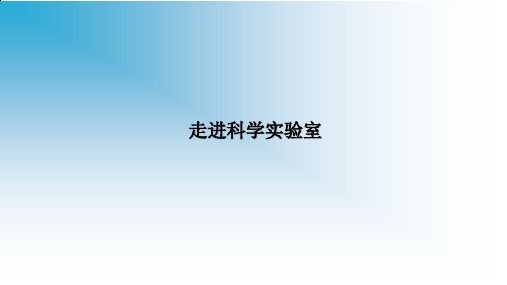
实验室安全
案例一:3月19日下午,成都某校一化学实验 室突然起火。事故原因是该校3名学生在实验时 操作失误,使金属钠与水接触,从而导致火灾 发生。且该实验室内还存有10公斤金属钠,一 旦引发爆炸,足以让所在的6层大楼顷刻灰飞烟 灭。
案例二:5月20日,某科技大学女研究生从事实 验时,高温物质溅出,导致脸部烫伤及双眼严 重伤害可能造成危险性的实验时,务必佩戴安全眼镜。 17. 若发生火警或意外,应保持镇定,立即向老师报告,并听从老师
指挥离开实验室。
找出潜在的危险
H A
B
D E
CG F
实验意外的简单紧急应变措施
实验意外的简单紧急应变措施
(a)烧伤或烫伤
(b) 化学品灼伤
用____冲洗受伤 用____冲洗并 部位,以减轻痛楚, 立即_____。 并立即_____。
找出哪些行为不符合实验室安全守则?
实验室守则
1. 没有老师陪同,学生不得进入实验室。 2. 未经老师批准,学生不得进入准备室。 3. 实验室内不准喧哗或嬉戏。 4. 实验室内不准饮食。 5. 未经老师准许,学生不得触摸任何仪器、用具或
化学药品。 6. 学生必须按照老师的基本要求进行实验。 7. 使用后的仪器或化学药品必须放回原处。 8. 切勿把实验后剩余的化学药品倒回试剂瓶内。
走进科学实验室
认识我们的实验室
认识科学实验室
灭火器
灭火
灭火
灭火沙桶
化学急救箱
急救
试管
盛取液体或 固体试剂 、 可以加热
酒精灯
用来加热
烧杯
盛取物质, 可以加热
显微镜
可以帮助我 们观察肉眼 看不见的物 质。
实验室守则
1、没有老师陪同,学生不得进入实验室。 2、未经老师批准,学生不得进入准备室。 3、实验室内喧哗或嬉戏。 4、实验室内不准饮食。 5、未经老师批准,学生不得触摸任何仪器、用具或化学药品。 6、学生必须按照老师的基本要求进行实验。 7、使用后的仪器或化学药品必须放回原处。 8、切勿把实验后剩余的药品倒回试剂瓶。 9、每次取出化学药品后必须盖好瓶塞。 10、不溶解的固体、废物或火柴等物体应放入指定的容器内,切勿倒入 洗涤槽内。
- 1、下载文档前请自行甄别文档内容的完整性,平台不提供额外的编辑、内容补充、找答案等附加服务。
- 2、"仅部分预览"的文档,不可在线预览部分如存在完整性等问题,可反馈申请退款(可完整预览的文档不适用该条件!)。
- 3、如文档侵犯您的权益,请联系客服反馈,我们会尽快为您处理(人工客服工作时间:9:00-18:30)。
第二节 创新型企业的社会环境
一、企业的三种基本活动
1、目标市场确定,企业选择了能够增强自身竞争力的技术后,便会制定战略。
2、企业为获得未来能带来利润的市场而需对技术改进进行投资时,便会进行财务管 3、企业整合资源以将资源转变成可出售产品时,便会进行组织构建。
结论:(1)战略、财务和组织并不一定能形成创新,但能够支持创新的过程
(2)三种活动的类型和对创新过程的支持会随产业活动、制度环境和时间点
第二节 创新型企业的社会环境
二、战略、财务和组织对创新过程的支持
1、创新是一种学习的过程,学习如何能以生产出低成本、高质量产品的方式改进技 2、创新的特点(O’Sullivan)
不确定性:对改变技术和进入市场过程中需要学习的内容只有实践的人才会了解 累积性:并非一次性完成,今天的学习结果可为明天奠定基础——财务的支持 集体性:需要不同技能的人进行合作,无法单独完成——组织的支持
集合的组织。人们为企业贡献自己的劳务,此时他们不仅是独立的个人,还是致力于学
性资源的团队中的成员。创新性经验的积累使企业能够克服“管理的局限”,在积累经
最优化型企业理论中,这一局限会招致成本的提高并阻碍企业发展——“基于资源”企
(2)基于资源的企业理论基本观点:关注一个企业所拥有的而其竞争者难以仿制的
牛津创新手册
第一部分 创新的形
第二章 创新型企业
威廉·拉佐尼克 William Lazonick
彭罗斯:没有涉及时间和空间的普遍真 是不可能概括出经济事件的特征的。
第一节 引言
本章结构
第二节 创新型企业的社会环境:以创新型企业理论为基础,推导出“创新型企业的
第三节 英国工业区:关注创新能力的区域聚集,即“马歇尔工业区” 第四节 美国经理制企业:美成长轨迹与分析 第五节 日本的挑战:日本模式里的创新型企业 第六节 新经济模式:美国信息通信技术产业 第七节 了解创新型企业:理论建议
3、组织行为决定了企业的激励机制,激励个人行为和能力向集体学习转化
第二节 创新型企业的社会环境
四、创新型企业的社会环境 1、创新的核心问题:技能基础(skill base) 2、战略控制决定了战略决策者如何选择建立“资产地位”
3、财务状况决定了企业是否有可利用的资源沿着“进化之路”进行持续投资直到
获得经济上的回报
4、组织行为决定了企业的激励机制,激励个人行为和能力向集体学习转化
第三节 英国工业区
一、背景 1、18世纪后期的工业革命使英国成为世界头号工业国家
2、19世纪后期,英国工业区积累了巨大的生产能力,技术工人通过在职学徒制度
不再神秘而是无处不在”(马歇尔) 3、材料标准化和机械自动化初级水平,熟练的技术工人起着关键作用。
(2)1911年首次出版《经济发展理论》期间认为:创新型企业是非凡人物的创业
(3)1942年首次出版《资本主义、社会主义与民主》期间认为:创新型企业是大 ”活动,创新的系统化和合理化使得创新更为可靠有效。
第二节 创新型企业的社会环境
三、创新型企业理论的演进
4、“基于资源”的企业理论
(1)1959年《企业成长理论》首次出版Edith Penrose:现代法人企业是一个管理
第二节 创新型企业的社会环境
三、创新型企业理论的演进 1、最优化型企业
(20世纪)最优化型企业:在既有的技术能力和市场价格(包括投入和产出)下
(1)后人运用马歇尔的观点构建了经济学教科书中关于最优化型企业的坚实理 (2)马歇尔对最优化型企业遭遇瓶颈的解释:“富不过三代”
第二节 创新型企业的社会环境
—历史性变革(即一种资源配置的模式,Lazonick,2002)
第二节 创新型企业的社会环境
三、创新型企业理论的演进 3、熊彼特的研究:创新的主体从个人到企业(集体)
(1)熊彼特认为,具有创新精神的企业家通过对生产资源进行“新的组合”,破
的经济生活的循环流动”,并由此认为创新型企业可以对最优化型企业提出挑战,并
未解释:为什么某些企业能获得这些资源而其他企业不能,这些企业是如何获 究竟为什么珍贵且不可仿制。
第二节 创新型企业的社会环境
三、创新型企业理论的演进 5、“基于组织”的企业理论 理查德·纳尔逊和西德尼·温特:大企业的持续发展以组织的能力为基础, 以隐性知识为特征,植根于日常活动之中
Bruce Kogut, Udo Zander,1996:企业是代表协调和学习社会知识的组织。
第三节 英国工业区
二、英国工业区创新集聚的特点(马歇尔式工业区) 1、技术工人作为机器的制造者和使用者,在某一特定区域内是创新的主要来源 2、技能形成的地域性和在职性是促使工业区发展壮大的主要因素
(1)工业区里,产品需求旺盛时,常常出现技术工人自己创建的新专业化生产
(2)工业区的发展吸引地区通信和商品流通设施的投资,方便原料供给、半成
三、创新型企业理论的演进 1、最优化型企业
(20世纪)最优化型企业:在既有的技术能力和市场价格(包括投入和产出)下
(1)后人运用马歇尔的观点构建了经济学教科书中关于最优化型企业的坚实理论 (2)马歇尔对最优化型企业遭遇瓶颈的解释:“富不过三代” 2、创新型企业:
通过改进技术及市场条件降低生产成本或生产更高质量的产品,并借此讲自己与行
强调企业理论中的集体因素。 未解决:什么人能够并且愿意进行战略性投资以便促成创新? 这些战略决策者如何争取到必须的资金? 他们如何动员企业管理层及业务人员通力合作以实现创新战略?
第二节 创新型企业的社会环境
四、创新型企业的社会环境 1、战略控制决定了战略决策者如何选择建立“资产地位”
2、财务状况决定了企业是否有可利用的资源沿着“进化之路”进行持续投资直到 获得经济上的回报
(3)区域集中促成垂直专业化,造成高度横向竞争,所有权和经营权相结合,
3、先进技术和组织改良的推广:本地商业报刊的报道和培训学徒转投其他雇主,没
4、学习实体或者创新主体是整个工业区(常为区中特定村镇),而非单个企业,开 无战略指导0世纪70年代后期,“马歇尔式工业区”的理论复兴 同:1、工业活动集中在纺织品、鞋袜和轻机械领域 2、每项工业活动中均存在大量垂直工业化的私有企业 3、劳动力是企业竞争优势的主要来源,企业主往往曾是技术工人 异:1、第三意大利地区积极推动建立企业间合作体;
